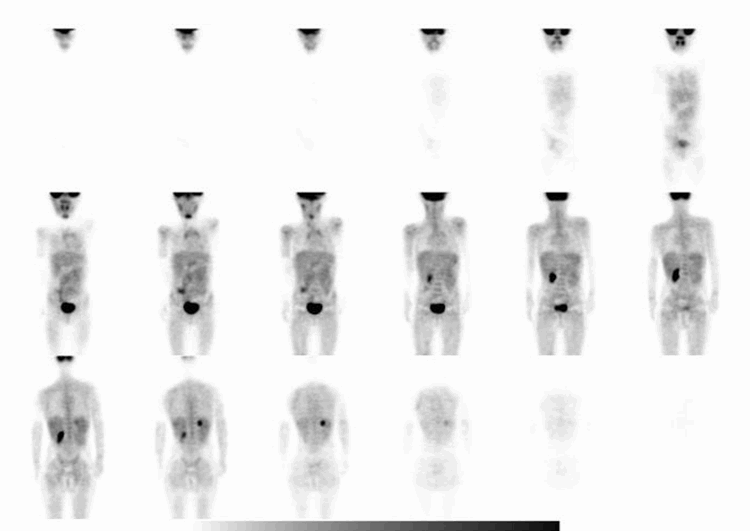Case Author(s): Jabi Shriki, M.D., Rick Held, M.D., and Jerold Wallis, M.D. , 06/21/06 . Rating: #D1, #Q.
Diagnosis: Adrenocortical Carcinoma in a patient with known Li-Fraumeni Syndrome
Brief history:
Young girl with Li Fraumeni syndrome. She has previously had an adreno cortical carcinoma, which was resected one year ago. Evaluate for tumor recurrence.
Images:

Coronal images from an FDG PET scan,
View main image(pt) in a separate image viewer
Full history/Diagnosis is available below
Diagnosis: Adrenocortical Carcinoma in a patient with known Li-Fraumeni Syndrome
Full history:
Young girl with Li Fraumeni syndrome. She previously presented in one year prior to the current study with precocious puberty and was subsequently found to have an adrenocortical carcinoma. She underwent adrenalectomy and left nephrectomy at that time, but has since then, had rising sex hormone levels. She has not undergone chemotherapy or radiation therapy. Evaluate for tumor recurrence.
Radiopharmaceutical:
2-deoxy-(2,2)18F-fluoro-D-glucose (FDG)
Findings:
Coronal PET images, after administration of FDG demonstrate increased tracer uptake in the left retroperitoneum. Also noted, the left kidney is missing, consistent with prior nephrectomy for an adrenal cortical carcinoma.
Discussion:
Li-Fraumeni syndrome (LFS) is a disorder in which there is a somatic mutation of p53, an important tumor suppressor protein located on he short arm of chromosome 17. Patients with this syndrome are predisposed to multiple tumors including soft-tissue sarcoma, breast cancer, leukemia, osteosarcoma, melanoma, and cancer of the colon, pancreas, adrenal cortex, and brain.
In evaluating patients with genetic disorders of tumor suppression it is important to know what tumor types occur with increased frequency in that genetic disorder.
Followup:
After the PET scan demonstrated persistent uptake in the left retroperitoneum, this patient again underwent surgical resection, confirming the diagnosis and removing the residual tumor.
Major teaching point(s):
In a pediatric patient with a rare tumor, a search should be undertaken for an underlying disorder which may predispose to tumor formation. It is also important to know what tumors may occur with increased frequency in various disorders.
Differential Diagnosis List
Other hypermetabolic retroperitoneal tumors would have a similar scintigraphic appearance, although given the history, recurrence of adrenocortical carcinoma was felt to be most likely.
ACR Codes and Keywords:
References and General Discussion of PET Tumor Imaging Studies (Anatomic field:Gasterointestinal System, Category:Neoplasm, Neoplastic-like condition)
Search for similar cases.
Edit this case
Add comments about this case
Return to the Teaching File home page.
Case number: pt149
Copyright by Wash U MO

